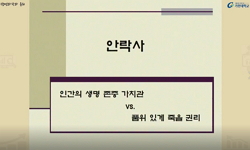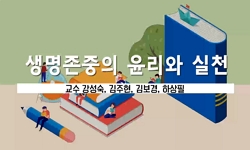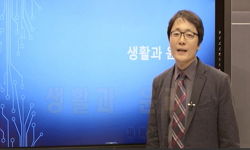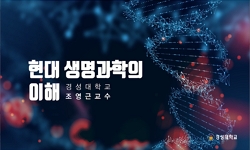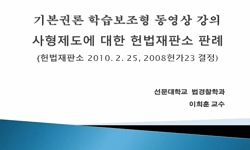Human cloning is a very difficult problem staying on a coordinate which includes human lives and the need for regulation against cloning activity to avoid any disaster caused by the birth of cloned offspring. The human fetus is originated from the ear...
http://chineseinput.net/에서 pinyin(병음)방식으로 중국어를 변환할 수 있습니다.
변환된 중국어를 복사하여 사용하시면 됩니다.
- 中文 을 입력하시려면 zhongwen을 입력하시고 space를누르시면됩니다.
- 北京 을 입력하시려면 beijing을 입력하시고 space를 누르시면 됩니다.

인간복제를 규제하는 국제규범 -「생명윤리 및 안전에 관한 법률」의 문제점과 개정방향 모색- = International Norms Regulating Human Cloning: The Problems in Life Ethics and Safety Act of Republic of Korea and the Direction for the Revision
한글로보기https://www.riss.kr/link?id=A99928737
- 저자
- 발행기관
- 학술지명
- 권호사항
-
발행연도
2014
-
작성언어
-
-
주제어
인간복제 ; 생명윤리 ; 생명권 ; 인간배아 ; Human Cloning ; Life Ethics ; right of life ; Human embryo
-
KDC
300
-
등재정보
KCI등재
-
자료형태
학술저널
-
수록면
809-834(26쪽)
-
KCI 피인용횟수
2
- DOI식별코드
- 제공처
- 소장기관
-
0
상세조회 -
0
다운로드
부가정보
다국어 초록 (Multilingual Abstract)
Human cloning is a very difficult problem staying on a coordinate which includes human lives and the need for regulation against cloning activity to avoid any disaster caused by the birth of cloned offspring. The human fetus is originated from the early stage of a life, a human embryo. Thus the national obligation to protect lives should be logically expanded to the protection of human embryos as well as the effort to eliminate any risk intimidating sound existence of them. The possible methods to regulate cloning activities divide by ① the total ban on any kind of embryo production or cloning ② the partial permission of embryo production or closing for the purpose of biomedical technology research which still prohibits implanting a cloned embryo into a woman`s uterus or other cultivation environment like pregnancy. As a result the method of ② means the utilization of cloned embryo for the purse of treatment, which accompanies the controversies against balance and conflict for interests between a life and a life. 「United Nations Declaration on Human Cloning」demands UN member countries to adopt all necessary methods for proper protection of human lives, to prohibit human cloning (including embryo cloning) which is not matched with the dignity of man as well as life protection, to ban genetic engineering against human dignity, and to adopt any method protecting the utilization of women as domestic law. Under Article 1 of the 「Additional Protocol to the Convention for the Protection of Human Rights and Dignity of the Human Being with regard to the Application of Biology and Medicine, on the Prohibition of Cloning Human Beings」, “Any intervention seeking to create a human being genetically identical to another human being, whether living or dead, is prohibited.” Most of countries currently prohibit human cloning including treatment purpose as a domestic law. Jumping on the vague hope of general public which was created by the fabrication of experimental results done by Dr. Hwang Woo-Suk and the exaggeration of treatment effects using by somatic cell cloning embryo, it is a big problem to legislate 「the Life Ethics and Safety Act」which restrictively allows embryo cloning. Especially the embryo exchange done by a researcher in Hwang Woo-Suk case practically shows the possibility that embryo cloning for treatment purchase could be abused as reproductive human cloning. According to the international rule or the legislative examples of other countries, 「the Life Ethics and Safety Act」should be reformed as strictly banning human cloning. To prohibit reproductive human cloning, all kinds of human embryo cloning would be completely banned. It would not be late to review the amendment of this law later when the need of embryo cloning for treatment purpose is clearly proved. As another alternative, embryo cloning for treatment research purpose would be limitedly allowed however the enforcement of the legislation would be deferred until it is proved that ① embryonic stem cells are overwhelmingly superior to non-embryonic stem cells for the treatment of intractable disease ② embryonic stem cells have more outstanding biomedical value than the embryonic stem cells formed from IVF.
참고문헌 (Reference)
1 한수웅, "헌법학" 2013
2 이인영, "생명의 시작과 죽음 : 윤리논쟁과 법 현실" 삼우사 2009
3 류병운, "국제법" 형설출판사 2013
4 Wilmut, I., "Viable offspring derived from fetal and adult mammalian cells" 385 : 1997
5 Jacques Cohen, "The Science, Fiction, and Reality of Embryo Cloning, in Ethical Issues in Human Cloning" 2001
6 Jose B. Cibelli, "The First Human Cloned Embryo" 2002
7 Wilmut, I., "Sheep cloned by nuclear transfer from a cultured cell line" 380 : 1996
8 Masahito Tachibana, "Human Embryonic Stem Cells Derived by Somatic Cell Nuclear Transfer" 153 (153): 2013
9 President's Council on Bioethics, "Human Cloning and Human Dignity: An Ethical Inquiry-Executive Summary, Issues" 18 : 2002
10 Pratheep Sevanthinathan, "Heavy Regulation of Human Cloning as an Alternative to a Complete Ban" 10 : 2007
1 한수웅, "헌법학" 2013
2 이인영, "생명의 시작과 죽음 : 윤리논쟁과 법 현실" 삼우사 2009
3 류병운, "국제법" 형설출판사 2013
4 Wilmut, I., "Viable offspring derived from fetal and adult mammalian cells" 385 : 1997
5 Jacques Cohen, "The Science, Fiction, and Reality of Embryo Cloning, in Ethical Issues in Human Cloning" 2001
6 Jose B. Cibelli, "The First Human Cloned Embryo" 2002
7 Wilmut, I., "Sheep cloned by nuclear transfer from a cultured cell line" 380 : 1996
8 Masahito Tachibana, "Human Embryonic Stem Cells Derived by Somatic Cell Nuclear Transfer" 153 (153): 2013
9 President's Council on Bioethics, "Human Cloning and Human Dignity: An Ethical Inquiry-Executive Summary, Issues" 18 : 2002
10 Pratheep Sevanthinathan, "Heavy Regulation of Human Cloning as an Alternative to a Complete Ban" 10 : 2007
11 Brad Spurgeon, "France Bans Reproductive and Therapeutic Cloning" BMJ
12 Hall, J.L., "Experimental Cloning of Human Polypoid Embryos Using an Artificial Zona Pellucida"
13 WS HWANG, "Evidence of a Pluripotent Human Embryonic Stem Cell Line Derived from a Cloned Blastocyst" 303 (303): 1669-1674, 2004
14 Yuriko Mary Shikai, "Don'T Be Swept Away By Mass Hysteria: the Benefits of Human Reproductive Cloning and Its Future" 33 : 2004
15 Daniel M. Cohen, "Cloning and the Constitution" 26 : 2002
16 Dan W. Brock, "Cloning Human Beings: An Assessment of the Ethical Issues Pro and Con" 1998
17 Justine Durrell, "Can The Law Handle Human Cloning" 38 : 26-27, 2002
18 Nigel M, "Brave New World at the General Assembly: the United Nations Declaration on Human Cloning" 9 (9): 2008
동일학술지(권/호) 다른 논문
-
- 홍익대학교 법학연구소
- 강동욱 ( Dong Wook Kang )
- 2014
- KCI등재
-
우리 소년분류심사원 감호제도의 문제점 및 개선방안: 국제법상 아동의 자유 박탈에 관한 기본 원칙들을 중심으로
- 홍익대학교 법학연구소
- 장민영 ( Min Young Jang )
- 2014
- KCI등재
-
- 홍익대학교 법학연구소
- 최종선 ( Jong Sun Choi )
- 2014
- KCI등재
-
공시송달의 적법성 판단에 관한 고찰 -대법원 공시송달 관련 판례분석을 중심으로-
- 홍익대학교 법학연구소
- 이인영 ( In Young Lee )
- 2014
- KCI등재
분석정보
인용정보 인용지수 설명보기
학술지 이력
| 연월일 | 이력구분 | 이력상세 | 등재구분 |
|---|---|---|---|
| 2027 | 평가예정 | 재인증평가 신청대상 (재인증) | |
| 2021-01-01 | 평가 | 등재학술지 유지 (재인증) |  |
| 2018-01-01 | 평가 | 등재학술지 유지 (등재유지) |  |
| 2015-01-01 | 평가 | 등재학술지 유지 (등재유지) |  |
| 2014-10-27 | 학술지명변경 | 외국어명 : 미등록 -> Journal of hongik law review |  |
| 2011-01-01 | 평가 | 등재학술지 선정 (등재후보2차) |  |
| 2010-01-01 | 평가 | 등재후보 1차 PASS (등재후보1차) |  |
| 2008-01-01 | 평가 | 등재후보학술지 선정 (신규평가) |  |
학술지 인용정보
| 기준연도 | WOS-KCI 통합IF(2년) | KCIF(2년) | KCIF(3년) |
|---|---|---|---|
| 2016 | 0.59 | 0.59 | 0.61 |
| KCIF(4년) | KCIF(5년) | 중심성지수(3년) | 즉시성지수 |
| 0.6 | 0.59 | 0.693 | 0.42 |





 KCI
KCI KISS
KISS
